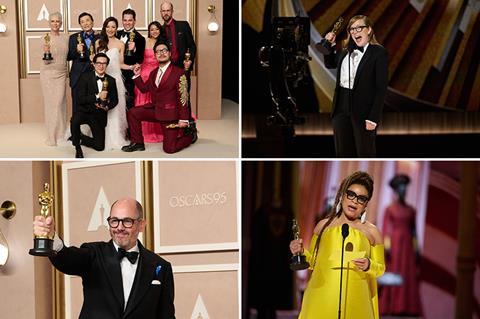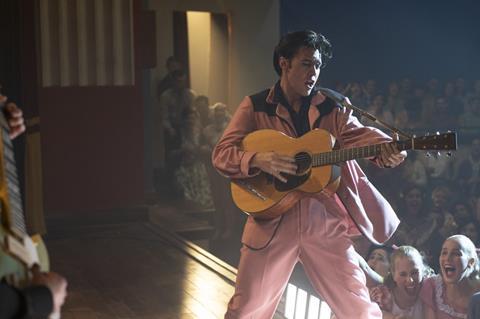
Oscar wins diverge away from Bafta. Is it a blip?
The 2023 Oscars dramatically pulled in a different direction from the Bafta Film Awards, after several years that showed extraordinary overlap in the winners.
The eight major categories – best picture, director, original and adapted screenplay, and the four performance awards – delivered different winners at both ceremonies, in a race that felt extraordinarily open, even after the Baftas delivered a surprising seven wins to Netflix’s First World War film All Quiet On The Western Front. But when the US guilds unanimously started anointing Everything Everywhere All At Once, it would have been a jaw-dropper if the Everything didn’t go home from the Oscars, with, well, (nearly) everything.
In contrast, despite notable discrepancies in nominations, the US and UK academies have recently shown remarkable overlap in the actual wins – lining up in at least 15 of the 19 feature categories that are common to both awards in 2020, 2021 and 2022.
In 2021, the year of Nomadland, the Oscars and Bafta Film Awards picked the same winners in 18 of the 19 feature categories that are common to both. This year, the two sets of awards picked the same winners in just seven – albeit significant – feature categories. They lined up in international feature (or film not in the English language in Bafta parlance – with All Quiet On The Western Front), animated feature (Guillermo Del Toro’s Pinocchio) and documentary (Navalny), plus cinematography and score (both All Quiet), editing (Everything Everywhere) and visual effects (Avatar: The Way Of Water).
In addition, the two sets of awards picked the same winner in live-action short (An Irish Goodbye) and animated short (The Boy, The Mole, The Fox And The Horse).
The three specialised feature categories (international, documentary and animation) continue a remarkable run of overlapping winners, matching for international feature/film not in the English language for five consecutive years, and for four of the past five years in the case of documentary and animated feature.
Despite similar voting patterns in recent years, the divergence in the major categories this time may be explained by considering the films that became rallying points for voters. Bafta voters notably responded to a pair of European titles (the anti-war lament All Quiet On The Western Front and the homegrown favourite The Banshees Of Inisherin), plus also Elvis – and Bafta has traditionally shown love to Baz Luhrmann films.
But this year Ampas voters gave nothing to The Banshees Of Inisherin and Elvis, and were less generous to All Quiet On The Western Front, instead rallying around a ground-breaking Asian American film, Everything Everywhere All At Once.
Time will tell whether this was just a blip, or if the academies will increasingly develop divergent voting patterns.
Diversity debate on hold, for now.
It was a largely positive night for representation at the Oscars, headed by the seven wins for Everything Everywhere, Ruth E Carter’s second Oscar for best costume design for Black Panther: Wakanda Forever, repeating her win for the original film, and Sarah Polley’s statuette for adapted screenplay for Women Talking. (And the significance of these wins were referenced in speeches: “For all the little boys and girls who look like me watching tonight, this is the beacon of hope and possibilities, this is proof that – dream big, dreams do come true,” said Yeoh, accepting her best actress award; while Carter opened her speech by saying, “Thank you to the Academy for recognising the superhero that is a Black woman…”)
But without the headline-grabbing Everything wins, it wasn’t a great night. Films directed by white men dominated most of the categories, with no woman nominated in the best directing category, and Mandy Walker missed out on becoming the first woman in the history of the Academy Awards to win the best cinematography prize for Elvis. Last week she became the first ever woman to win the feature competition at the ASC Awards. The cinematography Oscar went to Bafta winner James Friend for his work on All Quiet On The Western Front.
Banshees, Elvis, TAR, Fabelmans all head home empty-handed

Martin McDonagh’s The Banshees Of Inisherin went into the evening as the second most nominated film with nine nods, just behind Everything Everywhere All At Once. But the Irish tragi-comedy was pipped to the post in every single category, in contrast to its four-award haul at the Baftas.
Baz Luhrmann’s biopic Elvis scored eight nominations and was deemed to have a strong chance in several categories. As it was, Bafta winner Austin Butler was beaten by SAG winner Brendan Fraser for The Whale.
Catherine Martin was nominated in three categories (best film, costume design and production design) but lost out in each. As previously noted, Mandy Walker lost the cinematography Oscar to Bafta winner James Friend.
Steven Spielberg’s semi-autobiographical The Fabelmans had seven nods, the audience award from Toronto and the director’s emotional lifetime achievement award speech from Berlin to bolster its campaign. But the filmmaker, who has best director Oscars for Saving Private Ryan and Schindler’s List, was unable to make it a hat-trick in the category, losing out to Daniel Kwan and Daniel Scheinert for Everything Everywhere All At Once.
Todd Field’s psychological drama TAR also came away with nothing to show for its six nominations. Cate Blanchett was a strong contender, hoping to add to her two best actress wins (for The Aviator in 2005 and Blue Jasmine in 2014) but lost out to Michelle Yeoh.
A24 and Netflix dominate distributor chart
A24 and, to a lesser extent, Netflix, dominated proceedings with films that bypassed what has become the familar A-list festival route. A24’s multiverse action film Everything Everywhere debuted at South By Southwest in March 2022 before opening around the world shortly afterewards, while Netflix’s All Quiet premiered at Toronto last September and received a limited awards-qualifying theatrical run in the US in October before launching globally on the platform that month.
A24 topped the Oscars distributor chart with nine awards in total: seven for Everything plus two for Venice premiere The Whale. The New York-based indie won the ‘big six’ awards: best film, director and, thanks to Fraser’s Whale win, all four acting categories.
Netflix scooped five awards: four for All Quiet, plus the animation Oscar for Guillermo del Toro’s Pinocchio, which also debuted at Venice. It’s a strong result for the streaming giant, which won just one award at last year’s Oscars: Jane Campion’s best director win for The Power Of The Dog.
There were not many awards left for the big studios, though Disney picked up two awards: costume design for Black Panther and visual effects for Avatar: The Way Of Water. MGM/United Artists, Paramount Pictures and Warner Bros won one award each, as did Variance Films, which distributed RRR (best original song winner for ‘Naatu Naatu’) in the US. Warner Bros’ released doc winner and Sundance 2022 premiere Navalny in the US.
Three films won more than one Oscar: Everything Everywhere All At Once, All Quiet On The Western Front and The Whale.
Few prizes for box office hits

The biggest box office films of 2022 came away with very few prizes at this year’s Oscars. The top grossing film of the year, Avatar: The Way Of The Water, which has taken $2.29 billion in cinemas worldwide, won one Oscar (best visual effects) out of four nominations.
The second biggest film, Top Gun: Maverick ($1.49 billion worldwide), had six nominations but came away with just one prize for best sound. Top Gun: Maverick star and producer Tom Cruise was notable by his absence from this year’s ceremony. Avatar director and producer James Cameron was also a no-show.
Meanwhile, the eighth biggest film of the year, Black Panther: Wakanda Forever ($859 million worldwide), converted one of its five nominations, with Ruth E. Carter winning for costume design, making it a double following her win for the first film Black Panther.
By contrast, the evening’s biggest winner Everything Everywhere All At Once has taken $107 million worldwide in cinemas.






![The Brightest SunScreen[Courtesy HKIFF]](https://d1nslcd7m2225b.cloudfront.net/Pictures/274x183/3/5/0/1448350_thebrightestsunscreencourtesyhkiff_312678.jpg)


















No comments yet